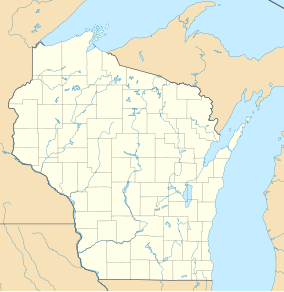The Big Beaver Creek Wildlife Area is a 572-acre (231 ha) tract of protected land located in Dunn County, Wisconsin, managed by the Wisconsin Department of Natural Resources (WDNR).[1] Land to be used for the wildlife area was first acquired in 1959 to provide access to the Big Beaver Creek and Little Beaver Creek, along with the associated wetlands complex. The other major goal was to open up the area to state-sponsored timber harvesting, specifically that of tamarack.
| Big Beaver Creek Wildlife Area | |
|---|---|
| Big Beaver Creek State Wildlife Area | |
IUCN category V (protected landscape/seascape) | |
| Location | Dunn County, Wisconsin |
| Nearest city | Menomonie, Wisconsin |
| Coordinates | 45°6′57″N 91°57′54″W / 45.11583°N 91.96500°W |
| Area | 572 acres (231 ha) |
| Established | 1959 |
| Governing body | Wisconsin Department of Natural Resources |
Big Beaver Creek
editThe Big Beaver Creek Wildlife Area is composed of two parts, the primary wildlife area to the south, and the somewhat separate Big Beaver Meadow State Natural Area.[2] The 110 acres (45 ha) natural area is to a large extent landlocked with little to no road access, which resulted in the offering up for sale of the most affected areas, a 78 acres (32 ha) tract of mostly sedge meadow.
Flora and fauna
editThere are several different species of trees in the wildlife area, including white pine, white oak, red oak, and two different species of maple, sugar maple and red maple. In addition to the various species of trees found on the property, there are six "high priority" species of bird that are known to frequent the area; the northern bobwhite quail, blue-winged warbler, brown thrasher, field sparrow, whip-poor-will and the willow flycatcher. Besides birds, white-tailed deer, turkeys and rabbits can be found in the area.[3]
While there has been a continuous effort by the WDNR to limit the expansion of invasive species detrimental to protected areas in Wisconsin, multiple such invasive florae reside in the Big Beaver Creek Wildlife Area. These include buckthorn, honeysuckle, garlic mustard and siberian elm. Invasive fauna include the gypsy moth[4] and emerald ash borer.[5]
See also
editReferences
edit- ^ WDNR Dunn County Interim Forest Management Plan- Retrieved 2022-03-14
- ^ WDNR Big Beaver Meadow State Natural Area Webpage- Retrieved 2022-03-14
- ^ WDNR Dunn County Natural Heritage Inventory data- Retrieved 2022-03-16
- ^ University of Wisconsin-Madison Gypsy Moth in Wisconsin Webpage- Retrieved 2022-03-16
- ^ WDNR Emerald Ash Borer Impact Webpage- Retrieved 2022-03-16
External links
edit- U.S. Geological Survey Map at the U.S. Geological Survey Map Website. Retrieved March 14, 2022.

